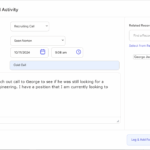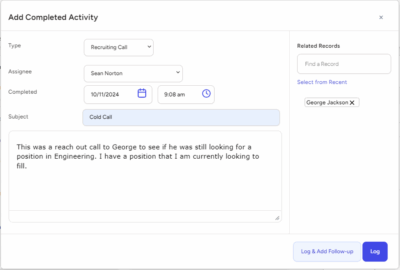Merely having an extensive candidate database is not enough to stand out and secure coveted job orders and search assignments from potential clients. What sets successful agency recruiters and search consultants apart is their ability to strategically leverage the concept of Most Placeable Candidates (MPCs).
These individuals possess exceptional qualifications, experience, and potential, making them highly sought after by employers. Effectively marketing MPCs to clients involves more than just showcasing their skills, though. It’s about demonstrating how they can fulfill the unique needs of an organization.
In this blog post, we will examine various strategies that professional recruiters and search consultants can employ to successfully market MPCs and secure job orders and search assignments from prospective clients.
Understanding Most Placeable Candidates (MPCs)
Before diving into marketing strategies, it’s essential to grasp the essence of what makes a candidate an MPC. Most Placeable Candidates are individuals who embody a rare blend of skills, experience, and qualities closely aligned with the requirements of top-tier positions within organizations.
Their track record of success, coupled with exceptional expertise in their field and the potential to drive significant value for employers, sets them apart. Identifying MPCs entails evaluating factors such as their past achievements, leadership capabilities, specialized skills, and cultural fit with potential employers.
To diver deeper into the concept of MPCs, it’s crucial to understand the criteria that define them. First, MPCs typically possess a proven track record of success in their respective fields. This success is often quantifiable through metrics such as revenue generated, projects completed, or teams led to success.
Second, MPCs demonstrate exceptional expertise and proficiency in their areas of specialization. Whether it’s a technical skill set, industry-specific knowledge, or leadership capabilities, MPCs excel in their domain. This sets them apart from their peers.
Third, MPCs exhibit the potential to drive significant value for employers. They possess the vision, strategic thinking, and innovative mindset necessary to propel an organization forward and make a tangible impact on its success.
Key Strategies for Marketing Most Placeable Candidates
There are multiple key strategies for marketing Most Placeable Candidates. They include tailored positioning and branding, building strong relationships, leveraging technology and data, showcasing success stories and testimonials, demonstrating cultural fit and leadership potential, offering value-added services, and continuous networking and brand-building.
Let’s explore each of these strategies individually, shall we?
Tailored Positioning and Branding
To effectively market an MPC, customization is key. Tailoring the candidate’s resume and professional profile to highlight their key achievements, skills, and experiences relevant to the target industry or role is critical. This involves not just listing their accomplishments, but also framing them in a way that resonates with the client’s needs and challenges.
In addition, crafting a compelling personal brand narrative that emphasizes the candidate’s unique value proposition and potential contributions to the organization can make a significant difference. This narrative should go beyond stating qualifications and explore the candidate’s story, motivations, and aspirations.
Utilize language and messaging that resonate with the client’s specific needs and challenges. This demonstrates how the MPC can effectively address them. By positioning the MPC as a solution to the client’s pain points, recruiters can capture their attention and differentiate themselves from competitors.
Building Strong Relationships
Investing time in building strong relationships with both candidates and clients is fundamental to success in recruitment. Understanding their individual needs, preferences, and expectations is the first step towards providing tailored solutions. This involves conducting thorough intake meetings with clients to gain insight into their company culture, values, and specific requirements for the role.
Similarly, building rapport with candidates through meaningful conversations and understanding their career goals, aspirations, and motivations is crucial. By developing a deep understanding of both parties, recruiters can effectively match Most Placeable Candidates with roles that align with their skills, experience, and aspirations.
Maintaining open lines of communication is essential throughout the recruitment process. Providing regular updates to clients about MPCs who match their criteria showcases a proactive approach to talent acquisition and demonstrates commitment to delivering results.
Similarly, keeping candidates informed about the status of their applications, providing feedback, and offering support throughout the hiring process builds trust and credibility. In the competitive world of recruitment, building strong relationships based upon trust and mutual respect can be a significant differentiator.
Leveraging Technology and Data
In today’s digital age, harnessing the power of technology and data analytics is indispensable for recruiters. Utilizing applicant tracking systems, AI-driven recruitment tools, and databases can streamline candidate sourcing and screening processes, saving time and resources.
These tools can help recruiters identify MPCs more efficiently by analyzing resumes, skills, and experience against predefined criteria. Moreover, leveraging data analytics can provide valuable insights into market trends, industry insights, and competitor activity. This enables recruiters to stay ahead of the curve and anticipate future hiring needs.
By embracing technology and data-driven approaches, recruiters can enhance their efficiency, accuracy, and effectiveness in identifying and attracting Most Placeable Candidates.
Showcasing Success Stories and Testimonials
One of the most powerful ways to market MPCs is by sharing success stories and testimonials from past placements. These stories provide tangible evidence of the value MPCs can bring to an organization and serve as compelling endorsements of their capabilities.
Whether it’s a case study highlighting a successful project delivered by an MPC or a testimonial from a satisfied client praising their contributions, these stories help build credibility and trust with prospective clients. In addition, using performance metrics such as revenue growth, cost savings, or productivity improvements to quantify the impact of MPCs further strengthens their value proposition.
By showcasing real-world examples of MPCs making a difference in organizations, search consultants can inspire confidence and generate interest among potential clients.
Demonstrating Cultural Fit and Leadership Potential
In addition to technical skills and experience, cultural fit and leadership potential are critical factors in evaluating Most Placeable Candidates. Clients often prioritize candidates who not only have the right skills, but who also align with their company culture and values.
Recruiters can demonstrate cultural fit by highlighting instances where the MPC has thrived in similar organizational cultures or industries. This may involve showcasing their adaptability, collaboration, and ability to work effectively in diverse teams.
Moreover, emphasizing the MPC’s leadership potential and ability to drive positive change within an organization can be a compelling selling point for clients. Providing examples of their strategic vision, decision-making prowess, and team-building skills can help clients envision the MPC’s potential impact on their organization’s success.
By showcasing both cultural fit and leadership potential, recruiters can present Most Placeable Candidates as holistic solutions to their clients’ hiring needs.
Offering Value-Added Services
In a crowded marketplace, offering value-added services beyond traditional recruitment can set search consultants apart from their competitors. These services not only add value to clients, but they also deepen the recruiter-client relationship and position recruiters as trusted advisors.
Some value-added services that recruiters can offer include talent mapping, succession planning, and market intelligence reports. Talent mapping involves identifying and profiling key talent within a client’s industry or market, providing insights into competitor talent pools and potential future hires.
Succession planning involves helping clients identify and develop internal talent pipelines to fill key leadership positions. Market intelligence reports provide clients with valuable insights into industry trends, competitor activity, and emerging talent pools. This enables them to make informed decisions about their talent strategy.
By offering these value-added services, recruiters can differentiate themselves from competitors and provide clients with comprehensive solutions to their talent acquisition needs.
Continuous Networking and Brand Building
Networking is an essential aspect of the recruitment industry. Building a strong personal brand can significantly enhance a search consultant’s credibility and visibility in the market. Continuous networking with industry professionals, thought leaders, and decision-makers helps expand a recruiter’s reach and build valuable connections.
This can involve attending industry events, participating in professional associations, and engaging with peers on social media platforms. In addition, investing in personal branding initiatives such as speaking engagements, thought leadership articles, and maintaining an active presence on social media can help establish a search consultant as a subject matter expert in their field.
By positioning themselves as trusted advisors and thought leaders, recruiters can attract top talent and generate leads for potential job orders and search assignments.
Most Placeable Candidates and Recruiting Success
Effectively marketing Most Placeable Candidates demands a strategic approach that transcends traditional recruitment methods. By tailoring positioning and branding, building strong relationships, leveraging technology and data, showcasing success stories, demonstrating cultural fit and leadership potential, offering value-added services, and continuous networking and brand building, professional recruiters and search consultants can enhance their ability to secure job orders and search assignments from prospective clients.
Adopting these strategies not only attracts top-tier talent, but it also establishes recruiters as trusted advisors and strategic partners to their clients. This serves to help drive mutual success in the world of talent acquisition.
In an ever-evolving recruitment landscape, staying ahead of the curve and adapting to changing market dynamics is essential for recruiters to thrive and succeed. By embracing innovation, embracing technology, and continuously refining their approach, agency recruiters and search consultants can position themselves for long-term success and become leaders in their field!









